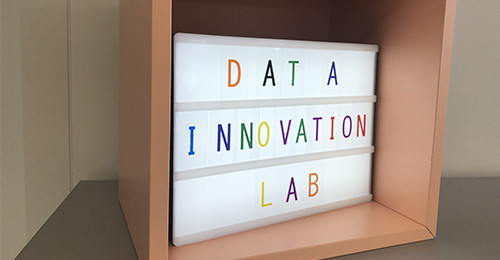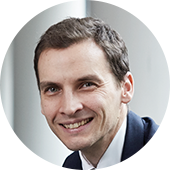Nadège Vignol, joint manager of the information technologies program at EDF R&D, tells us about the Data Innovation Lab.
– How would you pitch this Data Innovation Lab?
We noticed that data was a major issue in which we needed to invest more, working towards breaking down silos internally. We had skilled researchers who knew how to work transversally, but they were not sharing enough. Methods had been developed for one sector or another, which would benefit from being applied to the others. In a nutshell, our recommendations were to accelerate and break down those silos!
Having got the go-ahead from the R&D scientific council, we got started straight away on creating what was known from the start as the Data Innovation Lab.
– Knowing that some Divisions of the EDF group had not waited for it to be created to get their own Data Lab…
Our teams did indeed equip themselves with the necessary tools to process data and gain new skills. Our role was therefore to anticipate the next stage: the possible advances in terms of storage, algorithms, machine learning or artificial intelligence. Hence the use of the word “innovation” to make it clear that within R&D, our aim was to optimize the data, not the data of today but the data of the future.
– In the creation of your Data Innovation Lab, how much was due to the internal momentum of your R&D, and how much a result of what you were seeing in other R&D centers?
For the project requirements, we spoke individually with the experts from our different R&D departments and sectors, asking them how they envisaged the development of our skills as part of the digital transition; then the sectors of the EDF group, and lastly, the R&D divisions of other companies. As a result we came to realize that data was on the lips of all of our external contacts, starting with professionals in the financial sector, and that all, or nearly all, had a Data Lab to increase their capacity for innovation.
– Does that mean that, in your mind, data is just as much a source for the creation of value and innovation as it is a lever for change within the organization?
Yes, absolutely. Particularly since, it has to be said, once you take an interest in data, it is only meaningful, only able to create value, if you share it. Optimization of data is therefore not just a digital issue, it’s also a state of mind, involving greater interaction between the teams.
– What about open innovation? This on the other hand does seem to be an issue that you’ve seized upon?
Yes, perfectly. For now, we are focusing our efforts on mobilizing the teams internally. However, the next step will be to open ourselves up further to the academic world and that of start-ups. We have even envisaged organizing a competition with schools from the ecosystem, which will involve allowing them access to our data as input for their modeling works. We plan to optimize the experience R&D already has in terms of Open Innovation, in particular through the Innovation Hub launched a few months ago within R&D: a team “screens” start-ups there and hosts “Start-up cafés” every month, in a Paris-Saclay EDF Lab creativity room, allowing our researchers to talk to them informally. The R&D researchers are already regularly in contact with the Open Innovation team, which puts them in touch with start-ups that want to work with us. These start-ups may be from the Paris-Saclay ecosystem or elsewhere, including abroad.
– You say that data is based on old skills. Yet hasn’t there been a major change with the emergence of the digital platforms embodied by GAFA?
Yes, of course. Furthermore, in the project I mentioned, we pointed out the risk of “uberization”, in other words new forms of intermediation between the consumers and the producers of products or services. A risk which affects not just EDF, but all industrial groups. Not taking into account the impact of these platforms on the way in which cities, neighborhoods, and the accompanying services are designed. It is therefore crucial that traditional companies revolutionize themselves in order to retain contact with their customers and, beyond that, to stay in touch with the expectations of the general population.
What sets us apart from other industrial groups is the fact that we cover a wide range of sectors, from customer relations (and remember that customers can be an individual, a company, an administration or an authority) to energy distribution, not to mention production, which has diversified with the development of renewable energy sources (photovoltaic, wind power, etc.), both in France and internationally. All of these sectors represent sources of data that it is important to optimize.
– Could the Data Innovation Lab have come about anywhere other than in the Paris-Saclay ecosystem?
The Paris-Saclay EDF Lab site is particularly conducive to meeting colleagues from sectors other than your own. It hosts different teams in the same buildings. Interaction is made easier due to the creation of several open spaces, very pleasant areas in which to spend time, not to mention the landscape garden.
– Have you already forged links with players in the ecosystem through the Data Innovation Lab?
Yes, we have for example already approached the Jacques Hadamard Mathematics Foundation, that EDF R&D joined up with a year ago now, so as to understand the issues of data science from a mathematical point of view. Clearly, we need to move up a gear, using the Data Innovation Lab as a place to meet and share with the rest of the ecosystem, with four priority targets: 1) The higher education establishments of the University of Paris-Saclay, to identify talent as early as possible, and convince them to join EDF R&D, whether that be in France or abroad; 2) scientific partners such as, for example, the SystemX Institute for Technological Research, which is of particular interest for us and with which we have started to work, taking advantage of our geographical proximity; 3) industrial groups, and lastly 4) start-ups.

